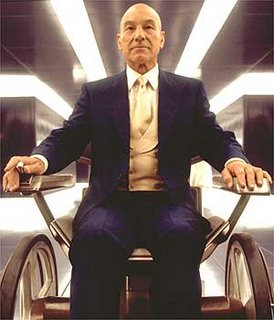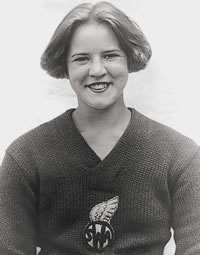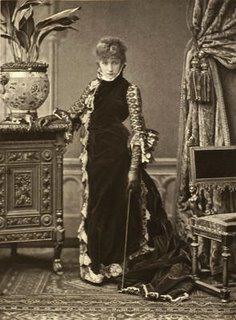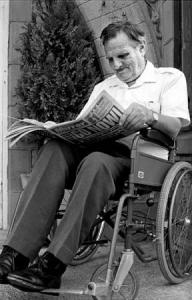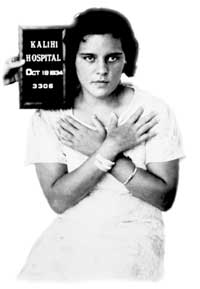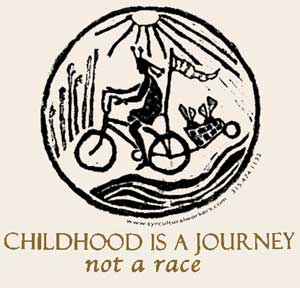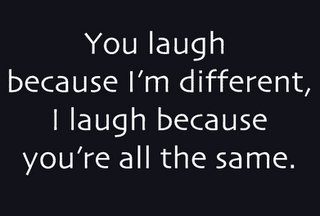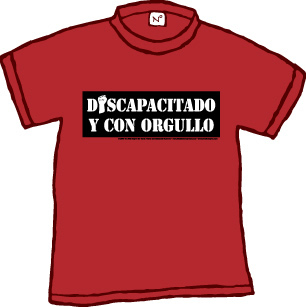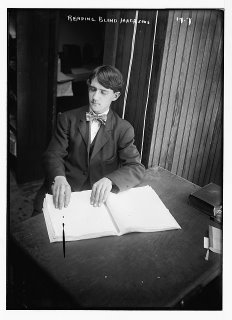
Welcome to the first Disability Blog Carnival! This follows DS,TU's own efforts to roundup recent disability-related blogging on a monthly basis (our "roundups" started in August 2005), and
Gimp Parade's Saturday Slumgullions,
Goldfish's Blogging Against Disablism Day, and other bloggers' similar efforts. As a carnival, we can use the apparatus of
blogcarnival.com, though it's got some accessibility problems (if anyone had trouble submitting either using the website form or sending directly to me, please leave your links in the comments here, so no one is left out). I'm ready to declare the experiment a success, because now my aggregator is even
more bursting with new and new-to-me bloggers writing great stuff on disability--so it worked, because it brought more stories to the collection than I was finding on my own. (For the curious, there were about twenty actual submissions--thanks to all who took the trouble.)
Don't-miss links: The Goldfish has a strong post called "
Ten Points about T4," in reaction to the discovery of a mass grave for victims of the Nazi eugenic euthanasia program. The Belonging Initiative features a four-minute YouTube video by Norman Kunc and Emma Van der Klift called "
A Credo for Support"--go, watch, now. Charles Dawson wrote up
a history of the wheelchair, or rather, of its absence in much of history. Stephen Kuusisto, commenting on upcoming elections, deterioration of ADA protections, and campus unrest at Gallaudet, declares: "
The Time is Now." From time to space:
Brooklynite reminds fellow able-bodied adults that "Children, the elderly, and people with disabilities don't use parks, restaurants, stores, museums, and theaters at our indulgence, because
it's not our space. It's everyone's space, and everyone has an equal claim on it." Chronic Pain Lifestyle uses
fractal geometry to explain the necessity for accessible parking spaces.
An Unreliable Witness has an honest post about being a new amputee, making clear, "I haven't been weeping and wailing over the loss of 'My leg! My poor leg!'" And Amanda at Ballastexistenz knows something about
Life's Infinite Richness.
In the news... It's always a pleasure to read Wheelchair Dancer when she's taking apart
a cliche-ridden disability story in the New York Times. Meanwhile,
Estee Klar is also taking a newspaper to task, for its coverage of an Autism Acceptance Project event--in which they interview none of the autistic presenters.
Emily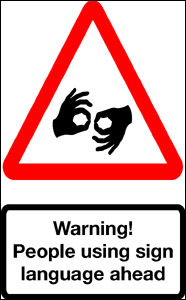 Elizabeth
Elizabeth, on the other hand, riffs on a news site that got Down syndrome right (for a change).
Lisa noted the too-pat headline "US Reports Disabled Access Attained," saying "Really? We did it? It's all a done deal now, I guess." Zilari would like to call a moratorium on the use of
bad analogies for autism, which this post lists, beginning with "car accidents, cancer, being burned in a fire..." Wonder what's going on at Gallaudet? There are
Deaf bloggers on
the scene...
check them out.
Religion and disability... Katja is waiting to see if there's real
accessibility at a renovated church...McNair asked
a prominent theologian a question about disability at a conference--and got shrugged off (misunderstood, he hopes)... Lisa is getting painted as the "
mad autism mom" for expecting accommodations at church...
Wheelie Catholic envisions the headlines, "Quad burns down famous church trying to prove she can light a candle," and agrees to let her friends help...
Intersections... Kestrell's thinking about the intersections between
queer and disabled; so is
Stephen Concklin; Fatshadow ponders the intersection of
fat and disability; Al Masters notes the comparative harmony that a
college campus seems to achieve in its diversity, a harmony rarely seen elsewhere; speaking of college, Blue has a great memory of dorm life in
Pickle for Three (in which three wheelchairs intersect, and hilarity ensues). And while people inevitably intersect, some folks still have an "as long as it doesn't affect me" attitude--
NTs are Weird writes on what's intolerant about that.
Graduations... JosieJose has
a fresh diploma to show off--and a
medal too...Lisa and her twins have their first
successful cross-town bus trip to tell about (with pics)...
NoDakWheeler is out of the nursing home...and at a Rolling Stones concert? (there's a cheap joke there, I'm sure)...a mother's speech on the occasion of her son's Bar Mitzvah admits, "
Things Change and So Will You." A start rather than an ending:
BloggingMone announces the founding of a Zentrum fur Disability Studies at her German university.
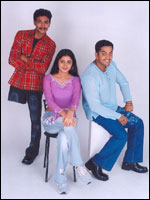 Entertainments...
Entertainments... Mark Siegel is dreaming of a reality TV gig, with the inevitable "
Tune in for this very special episode" tagline... the Doonesbury plotline "Pimp my Gimp" has prompted posts from
Kestrell and
Sara... On the TV show "Monk," the title character becomes blind for an episode--Stephen Kuusisto says it's "essentially
a repackaging of Mr. MaGoo." And when Comedy Central sponsors an all-star night to raise funds for Autism Speaks,
Kassiane has to ask, "Are these people aware of how STUPID it is to say eugenic research is helping autistics?" Liz Spikol has an essay on
Brian Wilson and "this parlor game of insanity."
Community.... Kristina Chew muses about
community...and so does
Al Masters...
Wheelchair Dancer misses the community feeling of having a partner on wheels. Schools need to spend more effort on
community outreach, says Charles Fox. When is inclusion not really inclusion? Read Andrea's "
Being the Class Project" (thanks to
Autism Street for that link). Where are all the old autistic people? In the community, often with other diagnoses. Autism Diva reports on "
the unhiding of the hidden horde." On a related note,
NTs are Weird says, "A person will spend the majority of their life as an adult, so having a good stable living situation is important and worth effort." Paralympic swimmer
Kara explains how having a disabled community helped her appreciate and celebrate the ways her body works. And if you're trying to be part of a workplace or academic community, check out the
Goldfish's Guide to Being Reasonable--because it's good to be reminded that everyone is human, fairness is hard to measure, and honesty is often the best policy.
Bodies... ImFunnyToo writes about body image and
Shock, and about the questions others feel entitled to ask her; Ranter reminds folks to respect her personal space--including her wheelchair; Lene has to be more protective of her space nowadays, and it's hard; Damon is wondering about insomnia and blindness--confessing, "I rather like the idea that I don't have a regular boring old standard 24-hour body clock. I run in a different timezone to everyone else." More bodies can appreciate a Universally Designed hotel--"in itself a work of art and a social statement worthy of appreciation and esteem," says Scott Rains.
But wait, there's more... Zephyr had a fine time listening in to "grandmother wisdom" at a support group for queer disabled people...and ate a lot of turkey on her Thanksgiving weekend (Canada celebrates the harvest in October, remember)... Darrell Shandrow wrote about accessibility problems with BlogLines, and got a response--from an engineer at BlogLines ... MuseumFreak is looking into getting a service dog ... Susan Senator is tired of the high-functioning/low-functioning labels: "How do you draw a definition around an entire human being?...It is about as telling as a chalk outline of a crime victim. And as dignified." For more on the damage of such labels, ABFH counters the "It's fine for you, but..." objections to autistic activism. Bronx teacher Miss Dennis catches a glimpse of her student's keen awareness of his surroundings. David is thinking about friendship. And it's good to see Mary Johnson back to blogging after a summer break.
Want to host a Disability Blog Carnival? We're recruiting! Let me know and we'll figure out a date that will work for you. The next installment of the Disability Blog Carnival will be hosted by Blue at Gimp Parade--deadline for entries is October 23, so start linking. Blue's selected theme for the next Carnival is "The Cure"--now, don't go thinking "ooh, 80s flashback." Unless, y'know, you can work that into a blog entry about disability culture, disability rights, disability studies....Mark Siegel's already Kickin' it Old Skool, and Manxome has been prompted to exclaim "Radical!" by a cool new gadget, if you want to take that route.
[Images shown: Blind man reading magazine from the Bain Collection, Library of Congress; caution road sign by Caroline Cardus; Malayalam performer Kutty and his Dancer castmates]
 Who's the most famous deaf woman born in the 19th-century US South? Hm, probably Helen Keller (1880-1968). But if you've ever been a Girl Scout, the second-most famous would surely be Juliette Gordon Low (1860-1927, shown at right), founder of the Girl Scouts of America. Every little Brownie learns the tale: Juliette "Daisy" Gordon was deaf in one ear from chronic and mistreated ear infections in her youth; the day of her wedding, they say, a thrown grain of rice lodged in her ear, subsequently causing further hearing loss. The story further goes that whenever Juliette Low wasn't getting her way in a meeting, she would pretend to hear "yes" for "no," and say, "Oh good, that settles it, then," taking advantage of her opponent's unwillingness to correct a grey-haired deaf lady (in a formidable uniform--she wore the uniform a lot, and was buried in it after her death from breast cancer at age 66).
Who's the most famous deaf woman born in the 19th-century US South? Hm, probably Helen Keller (1880-1968). But if you've ever been a Girl Scout, the second-most famous would surely be Juliette Gordon Low (1860-1927, shown at right), founder of the Girl Scouts of America. Every little Brownie learns the tale: Juliette "Daisy" Gordon was deaf in one ear from chronic and mistreated ear infections in her youth; the day of her wedding, they say, a thrown grain of rice lodged in her ear, subsequently causing further hearing loss. The story further goes that whenever Juliette Low wasn't getting her way in a meeting, she would pretend to hear "yes" for "no," and say, "Oh good, that settles it, then," taking advantage of her opponent's unwillingness to correct a grey-haired deaf lady (in a formidable uniform--she wore the uniform a lot, and was buried in it after her death from breast cancer at age 66).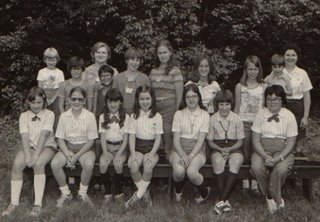 It's not all rosy: Some separate troops remain, and there have been lawsuits charging discrimination under the ADA, and scouting is still notorious for perpetuating "disability simulation" awareness activities of dubious utility. But today, the Girl Scouts will celebrate their founder's birthday, and another cohort of girls will learn about a strong deaf woman--and that's worth a little cheer.
It's not all rosy: Some separate troops remain, and there have been lawsuits charging discrimination under the ADA, and scouting is still notorious for perpetuating "disability simulation" awareness activities of dubious utility. But today, the Girl Scouts will celebrate their founder's birthday, and another cohort of girls will learn about a strong deaf woman--and that's worth a little cheer.
